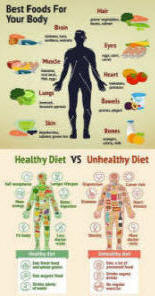
Nutrition and Balanced Diet

A
well-balanced diet is not just beneficial it is essential for
maintaining overall health and well-being. Making small, consistent
changes such as increasing the intake of fruits, vegetables, whole
grains, and lean proteins can result in noticeable improvements in
energy, immunity, and disease prevention. Reducing the consumption
of processed foods, added sugars, and saturated fats contributes to
better heart health and weight management.

Eating patterns like the Mediterranean diet, which emphasize
nutrient-dense, whole foods, have been linked to reduced risks of
cardiovascular disease and cognitive decline. Proper nutrition also
supports digestion, improves mood, and enhances skin health.
Maintaining a balanced diet helps fuel daily activities, supports
recovery from physical exertion, and lays the foundation for a long,
healthy life.
Key Principles of Good Nutrition
-
Prioritize whole, nutrient-dense foods like fruits, vegetables, whole grains, and lean proteins
-
Limit processed foods, refined sugars, and unhealthy fats
-
Maintain proper hydration by drinking adequate water throughout the day
-
Practice portion control to avoid overeating and maintain a healthy weight
-
Include a variety of foods to ensure a wide range of essential vitamins and minerals
-
Choose healthy fats such as those from nuts, seeds, avocados, and olive oil
-
Eat regular, balanced meals to support steady energy levels and metabolism
-
Consider planning meals ahead of time to encourage consistency and reduce impulsive choices
